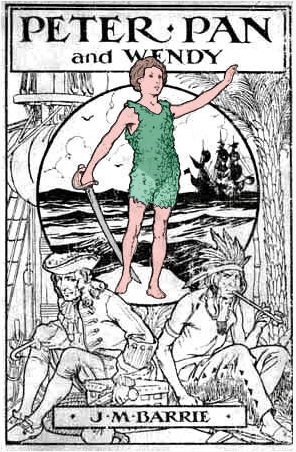Howard Fischer
Uppsala, Sweden


James Matthew Barrie (1860–1937) was a Scottish novelist and playwright. He wrote about thirty novels and twenty plays. He is best known for his 1904 play Peter Pan, or the Boy Who Wouldn’t Grow Up, which later became the 1911 novel Peter and Wendy.
When Barrie was six years old, his brother David, thirteen years old, died from head trauma in an ice skating accident. Their mother was devastated. James tried to take his dead brother’s place by wearing his clothes and imitating his mannerisms. Mrs. Barrie was “comforted” by the idea that her “dead son would remain a boy forever.” He would never grow up and leave her.1
A childless adult, Barrie was close friends with Arthur and Sylvia Llewelyn Davies and their sons. He was called “uncle” by the boys. After the death of Davies (1907) and then of his widow (1910), Barrie became the legal guardian and de facto father of the boys.
In 1929, Barrie unexpectedly gave the copyright of Peter Pan in perpetuity to London’s children’s hospital the Great Ormond Street Hospital. His reason was, and still is, unclear. He said, “At one time Peter Pan was an invalid in the hospital…and it was he who put me up to the little thing that I did.”2
The Great Ormond Street Hospital opened in 1852 and was the first children’s hospital in the UK. A pioneer in the research and treatment of children’s illnesses, it has been the site of a number of firsts in the UK, including the first Drinker “iron lung” (1934), pediatric neuroscience unit (1939), CT scanner (1977), and in utero surgery on a fetus. Great Ormond Street is also in the forefront of genetic treatments.3 In 2018–2019, the hospital had 238,000 outpatient visits and 43,000 inpatient admissions.4
In his will, Barrie gave the hospital all royalties from books, plays, and products related to the character of Peter Pan. This included royalties from the 1953 Disney animated film and the 2002 film Return to Neverland.5 It has been estimated that in 1929, royalties given to the hospital would have been today’s equivalent of 90,000 pounds for that one year.6 After the fiftieth anniversary of J.M. Barrie’s death (that is, the end of “perpetuity,” according to British law), the House of Lords added a clause to the Copyright, Design, and Patents Act, giving Great Ormond Street Hospital “Peter Pan” royalties—in the UK—forever. Barrie requested, in 1929, that the amount the hospital received in royalties never be made public.
References
- “J.M. Barrie.” Wikipedia.
- “Peter Pan.” Great Ormond Street Hospital Charity. gosh.org/about-us/peter-pan/.
- Great Ormond Street Hospital Charity. gosh.org.
- Great Ormond Street Hospital NHS Foundation Trust, 2022. gosh.nhs.uk.
- Matthew Rimmer. “Never Neverland: Peter Pan and perpetual copyright,” Incite, 2004.
- Katie Allen. “Never ends for Peter Pan,” The Guardian, 28 December 2007
HOWARD FISCHER, M.D., was a professor of pediatrics at Wayne State University School of Medicine, Detroit, Michigan.
